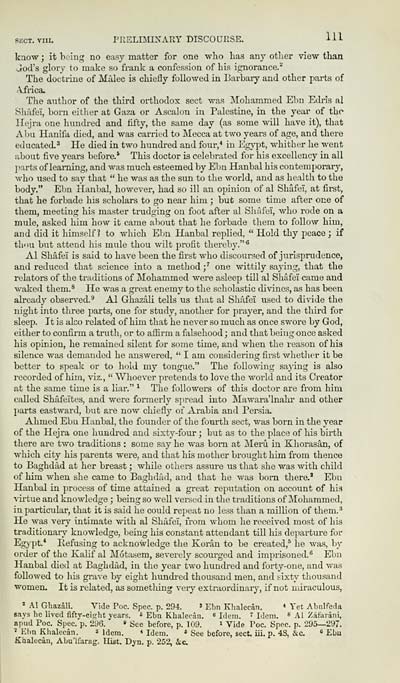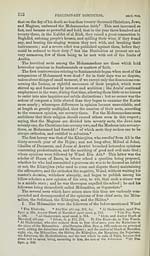Download files
Complete book:
Individual page:
Thumbnail gallery: Grid view | List view

PECT. vin, PRELIMINARY DISCO QESE. Hi
know ; it hcing no easy matter for one who has any other \dew than
Jod's glory to make so frank a confession of his ignorance.*
The doctrine of Malec is chiefly folio-wed in Barbaiy and other parts of
fVfrica.
The author of the third orthodox sect was ^Mohammed Ehn Edris al
Shafei, born either at Gaza or Ascalon in Palestine, in the year of the
ITejra one hundred and fifty, the same day (as some ^\ill have it), that
Al)u Hantfa died, and was carried to Mecca at two years of age, and there
educated.* He died in two huncted and four,* in Egyjit, whither he went
about five years before.* This doctor is celebrated for his excellency in all
l^arts of learning, and was much esteemed by Ebn Hanbal his contemporary,
who used to say that " he was as the sun to the world, and as health to the
body." Ebn Hanbal, however, had so ill an opinion of al Shafe'i, at first,
that he forbade his scholars to go near him ; but some time after one of
them, meeting his master trudging on foot after al Sliafe'i, who rode on a
mule, asked him how it came about that he forbade them to follow him,
and did it himself? to which Ebn Hanbal replied, "Hold thy peace; if
thou but attend his mule thou wilt j^i'ofit thereby."^
Al Shafei is said to have been the first who discoursed of jurisprudence,
and reduced that science into a method ;' one wittily sapng, that the
relators of the traditions of Mohammed were a-sleep till al Shafei came and
waked them.^ He was a gi-eat enemy to the scholastic divines, as has been
already observed.^ Al GhazaU tells us that al Shafei used to divide the
night into three parts, one for study, another for prayer, and the third for
sleep. It is aleo related of him that he never so much as once swore by God,
either to confirm a truth, or to afiirni a fiilsehood ; and that being once asked
his opinion, he remained silent for some time, and when the reason of his
silence was demanded he answered, " I am considering first whether it be
better to speak or to hold my tongue." The following saving is also
recorded of him, viz., " Wlioever pretends to love the world and its Creator
at the same time is a liar." ^ The followers of this doctor are from him
called Shafeites, and were formerly spread into Mawara'lnahi- and other
I)arts eastward, but are now chiefly of Ai*abia and Persia.
Ahmed Ebn Hanbal, the founder of the fourth sect, was born in the year
of the Hejra one hundi'ed and sixty-four ; but as to the place of his birth
there are two traditions : some say he was bom at j\Ieru in Khorasan, of
which city his parents were, and that his mother brought him from thence
to Baghdad at her breast ; while others assure us that she was with child
of him when she came to Baghdad, and that he was bom there.* Ebn
Hanbal in process of time attained a gi-eat reputation on account of his
^drtue and knowledge ; being so well versed in the traditions of Mohammed,
in particular, that it is said he could repeat no less than a million of them.*
He was very intimate with al Shafei, from whom he received most of his
traditionary knowledge, being his constant attendant till his departure for
Egypt.* Refusing to acknowledge the Koi'an to be created,* he was, l)y
order of the Kalif al M6t:isem, severely scourged and imprisoned.^ Ebn
Hanbal died at Baghdad, in the year two hundred and forty-one, and was
followed to Ids gi'ave by eight hundred thousand men, and t^ixty tliousand
women. It is related, as something very extraordinary, if not miraculous,
^ Al Ghazali. Vide Poc. Spec. p. 294. ' Ebn Khalecan. * Yet Abulfeda
says he lived fifty-eiccbt years. * Ebn Khalecan. « Idem. ^ idem. « Al Z.-ifarani,
apud Poc. Spec. p. 296. » See before, p. 109. i Vide Poc. Spec. p. 295—297.
» Ebn Khalecan. « idem. « Idem. * See before, sect. iii. p. 48, &.C. " Ebu
Khalecan, Abu'lfarag. Hist. Dyn. p. 252, it
know ; it hcing no easy matter for one who has any other \dew than
Jod's glory to make so frank a confession of his ignorance.*
The doctrine of Malec is chiefly folio-wed in Barbaiy and other parts of
fVfrica.
The author of the third orthodox sect was ^Mohammed Ehn Edris al
Shafei, born either at Gaza or Ascalon in Palestine, in the year of the
ITejra one hundred and fifty, the same day (as some ^\ill have it), that
Al)u Hantfa died, and was carried to Mecca at two years of age, and there
educated.* He died in two huncted and four,* in Egyjit, whither he went
about five years before.* This doctor is celebrated for his excellency in all
l^arts of learning, and was much esteemed by Ebn Hanbal his contemporary,
who used to say that " he was as the sun to the world, and as health to the
body." Ebn Hanbal, however, had so ill an opinion of al Shafe'i, at first,
that he forbade his scholars to go near him ; but some time after one of
them, meeting his master trudging on foot after al Sliafe'i, who rode on a
mule, asked him how it came about that he forbade them to follow him,
and did it himself? to which Ebn Hanbal replied, "Hold thy peace; if
thou but attend his mule thou wilt j^i'ofit thereby."^
Al Shafei is said to have been the first who discoursed of jurisprudence,
and reduced that science into a method ;' one wittily sapng, that the
relators of the traditions of Mohammed were a-sleep till al Shafei came and
waked them.^ He was a gi-eat enemy to the scholastic divines, as has been
already observed.^ Al GhazaU tells us that al Shafei used to divide the
night into three parts, one for study, another for prayer, and the third for
sleep. It is aleo related of him that he never so much as once swore by God,
either to confirm a truth, or to afiirni a fiilsehood ; and that being once asked
his opinion, he remained silent for some time, and when the reason of his
silence was demanded he answered, " I am considering first whether it be
better to speak or to hold my tongue." The following saving is also
recorded of him, viz., " Wlioever pretends to love the world and its Creator
at the same time is a liar." ^ The followers of this doctor are from him
called Shafeites, and were formerly spread into Mawara'lnahi- and other
I)arts eastward, but are now chiefly of Ai*abia and Persia.
Ahmed Ebn Hanbal, the founder of the fourth sect, was born in the year
of the Hejra one hundi'ed and sixty-four ; but as to the place of his birth
there are two traditions : some say he was bom at j\Ieru in Khorasan, of
which city his parents were, and that his mother brought him from thence
to Baghdad at her breast ; while others assure us that she was with child
of him when she came to Baghdad, and that he was bom there.* Ebn
Hanbal in process of time attained a gi-eat reputation on account of his
^drtue and knowledge ; being so well versed in the traditions of Mohammed,
in particular, that it is said he could repeat no less than a million of them.*
He was very intimate with al Shafei, from whom he received most of his
traditionary knowledge, being his constant attendant till his departure for
Egypt.* Refusing to acknowledge the Koi'an to be created,* he was, l)y
order of the Kalif al M6t:isem, severely scourged and imprisoned.^ Ebn
Hanbal died at Baghdad, in the year two hundred and forty-one, and was
followed to Ids gi'ave by eight hundred thousand men, and t^ixty tliousand
women. It is related, as something very extraordinary, if not miraculous,
^ Al Ghazali. Vide Poc. Spec. p. 294. ' Ebn Khalecan. * Yet Abulfeda
says he lived fifty-eiccbt years. * Ebn Khalecan. « Idem. ^ idem. « Al Z.-ifarani,
apud Poc. Spec. p. 296. » See before, p. 109. i Vide Poc. Spec. p. 295—297.
» Ebn Khalecan. « idem. « Idem. * See before, sect. iii. p. 48, &.C. " Ebu
Khalecan, Abu'lfarag. Hist. Dyn. p. 252, it
Set display mode to: Large image | Transcription
Images and transcriptions on this page, including medium image downloads, may be used under the Creative Commons Attribution 4.0 International Licence unless otherwise stated. ![]()
| Early Gaelic Book Collections > J. F. Campbell Collection > Koran: or, Alcoran of Mohammed > (133) |
|---|
| Permanent URL | https://digital.nls.uk/77135558 |
|---|
| Description | Volumes from a collection of 610 books rich in Highland folklore, Ossianic literature and other Celtic subjects. Many of the books annotated by John Francis Campbell of Islay, who assembled the collection. |
|---|
| Description | Selected items from five 'Special and Named Printed Collections'. Includes books in Gaelic and other Celtic languages, works about the Gaels, their languages, literature, culture and history. |
|---|

